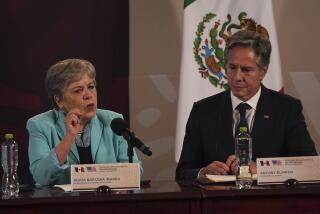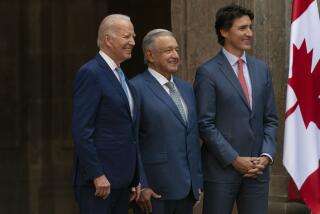$12-Billion Rescue
Debt negotiations between Mexico and major international banks that concluded this week in Washington were arduous and tense; half of Mexico’s $98-billion foreign debt is owed to commercial banks. While Mexico did not get all that it wanted in the meetings, it did get important concessions, along with $6 billion in new loans.
The new money is part of a $12-billion rescue package put together by the International Monetary Fund to give Mexico more time, and breathing space, to revive its depressed economy. The new loans will carry a lower interest rate than previous agreements. To relieve the burden of the existing debt, the banks also agreed to reschedule payments on $44 billion in mature loans for another 20 years. Without the concessions it is unlikely that Mexico would have paid even this year’s interest on its current debt.
But the bankers rejected Mexico’s request to tie about $2.4 billion in future loans to oil prices--a move that Mexico wanted as protection againsta new economic crisis if income from its major export item takes another drubbing from falling prices.
The bankers balked, fearing that such a link would lead other indebted nations in Latin America to make similar demands. That is sound economics, but may prove to be bad politics. Oil is an important national symbol in Mexico, and the other concessions that the banks gave President Miguel de la Madrid may be forgotten if his domestic critics focus on the failure to reach an oil-price agreement.
There will be criticism of the Mexican loan package in this country, too. The major-bank committee that negotiated with Mexico is sure to meet resistance when it tries to persuade 500 smaller banks to go along with the deal. It would help if U.S. Treasury Secretary James A. Baker III and Federal Reserve Chairman Paul A. Volcker joined in the campaign among smaller banks. They realize, better than many of their banking counterparts, that Mexico’s long-term financial health is more than a matter of economics.
Ultimately all Americans must be concerned about reviving Mexico’s economy--not because it would protect the money that the banks have on loan but because that is the best way to promote new growth there, and to revive hope among the nation’s 70 million people. Continued support for Mexico helps assure not just economic stability but political stability as well.
More to Read
Sign up for Essential California
The most important California stories and recommendations in your inbox every morning.
You may occasionally receive promotional content from the Los Angeles Times.










